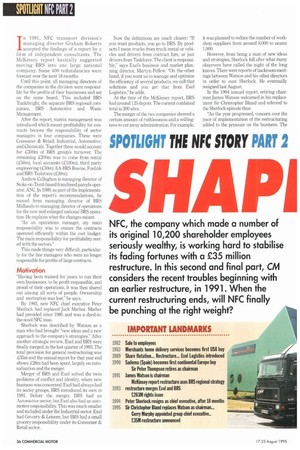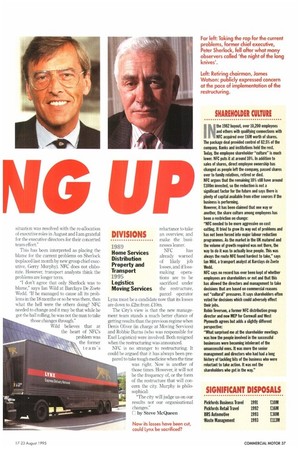I n1991, NFC transport division's managing director Graham Roberts accepted the
Page 38

Page 39

If you've noticed an error in this article please click here to report it so we can fix it.
findings of a report by a firm of independent consultants. The McKinsey report basically suggested moving BRS into one large national company. Some 400 redundancies were forecast over the next 18 months.
Until this point, all managing directors of the companies in the division were responsible for the profits of their businesses and sat on the same board. This included BRS Tankfreight, the separate BRS regional companies, BRS Automotive and Waste Management.
After the report, matrix management was introduced which meant profitability for contracts became the responsibility of sector managers in four companies. These were Consuiner & Retail, Industrial, Automotive, and Chemicals. Together these would account for £300m of BRS group's turnover. The remaining £200m was to come from rental (450m), local accounts (1:100m), third party engineering (L30m) AA-BRS Rescue, Fuelink and BRS Taskforce (,C2Orn).
Andrew Callaghan is managing director of Stoke-on-Trent-based franchised parcels operator, ANC. In 1989, as part of the implementation of the report's recommendations, he moved from managing director of BRS Midlands to managing director of operations for the new and enlarged national BRS operation. He explains what the changes meant.
"As an operations manager, my main responsibility was to ensure the contracts operated efficiently within the cost budget. The main responsibility for profitability rested with the sectors."
This made things very difficult, particularly for the line managers who were no longer responsible for profits of large contracts.
Motivation
"Having been trained for years to run their own businesses, to be profit responsible, and proud of their operations, it was then shared out among all sorts of people. Ownership and motivation was lost," he says.
By 1993, new NFC chief executive Peter Sherlock had replaced Jack Mather. Mather had presided since 1985 and was a dyed-inthe-wool NFC man.
Sherlock was described by Watson as a man who had brought "new ideas and a new approach to the company's strategies." After another strategic review, Exel and BRS were finally merged, in the last quarter of 1993. The total provision for general restructuring was 1.35m and the annual report for that year end shows £28m had been spent, largely on rationalisation and the merger.
Merger of BRS and Exel solved the twin problems of conflict and identity, where new business was concerned. Exel had always had its sector groups, BRS introduced its own in 1991. Before the merger, BRS had an Automotive sector, but Exel also had an automotive responsibility This was much smaller and included under the Industrial sector_ Exel had Grocery & Leisure, but BRS had a small grocery responsibility under its Consumer & Retail sector. Now the definitions are much clearer: "If you want products, you go to BRS. By products I mean trucks from truck rental or vehicles and drivers from contract hire, or just drivers from Taskforce. The client is responsible," says Exel's business and market planning director, Martyn Pellew. "On the other hand, if you want us to manage and optimise the efficiency of several products, we call that solutions and you get that from Exel Logistics," he adds.
At the time of the McKinsey report, BRS had around 125 depots. The current combined total is 200 sites.
The merger of the two companies showed a certain amount of ruthlessness and a willingness to cut away administration. For example, it was planned to reduce the number of workshop suppliers from around 8,000 to nearer 1,000.
However, from being a man of new ideas and strategies, Sherlock fell after what many observers have called the night of the long knives. There were reports of backroom meetings between Watson and his other directors in order to oust Sherlock. He eventually resigned last August.
In the 1994 annual report, retiring chairman James Watson welcomed in his replacement Sir Christopher Bland and referred to the Sherlock episode thus: "As the year progressed, concern over the pace of implementation of the restructuring added to the pressure on the business. The situation was resolved with the re-allocation of executive roles in August and jam grateful for the executive directors for their concerted team effort."
This has been interpreted as placing the blame for the current problems on Sherlock (replaced last month by new group chief executive, Gerry Murphy). NFC does not elaborate. However, transport analysts think the problems are longer term.
"I don't agree that only Sherlock was to blame," says Ian Wild at Barclays De Zoete 1Nedd. "If he managed to cause all its problems in the 18 months or so he was there, then what the hell were the others doing? NFC needed to change and it may be that while he got the ball rolling, he was not the man to take those changes through."
Wild believes that at the heart of NFC's problem was the former team's reluctance to take an overview, and make the businesses leaner.
NFC has already warned of likely job losses, and if lossmaking operations are to be sacrificed under the restructure, parcel operator Lynx must be a candidate now that its losses are down to 12m from 4:10m.
The City's view is that the new management team stands a much better chance of getting results than the previous regime when Denis Oliver (in charge at Moving Services) and Robbie Burns (who was responsible for Exel Logistics) were involved. Both resigned when the restructuring was announced.
NFC is no stranger to restructuring. It could be argued that it has always been pre pared to take tough medicine when the time was right. Now is another of those times. However, it will not be the frequency of, or the form of the restructure that will concern the city. Murphy is philosophical: Home Services Distribution Property and Transport 1995 Logistics Moving Services "The city will judge us on our results not our organisational changes"
I— by Steve McQueen
























































































